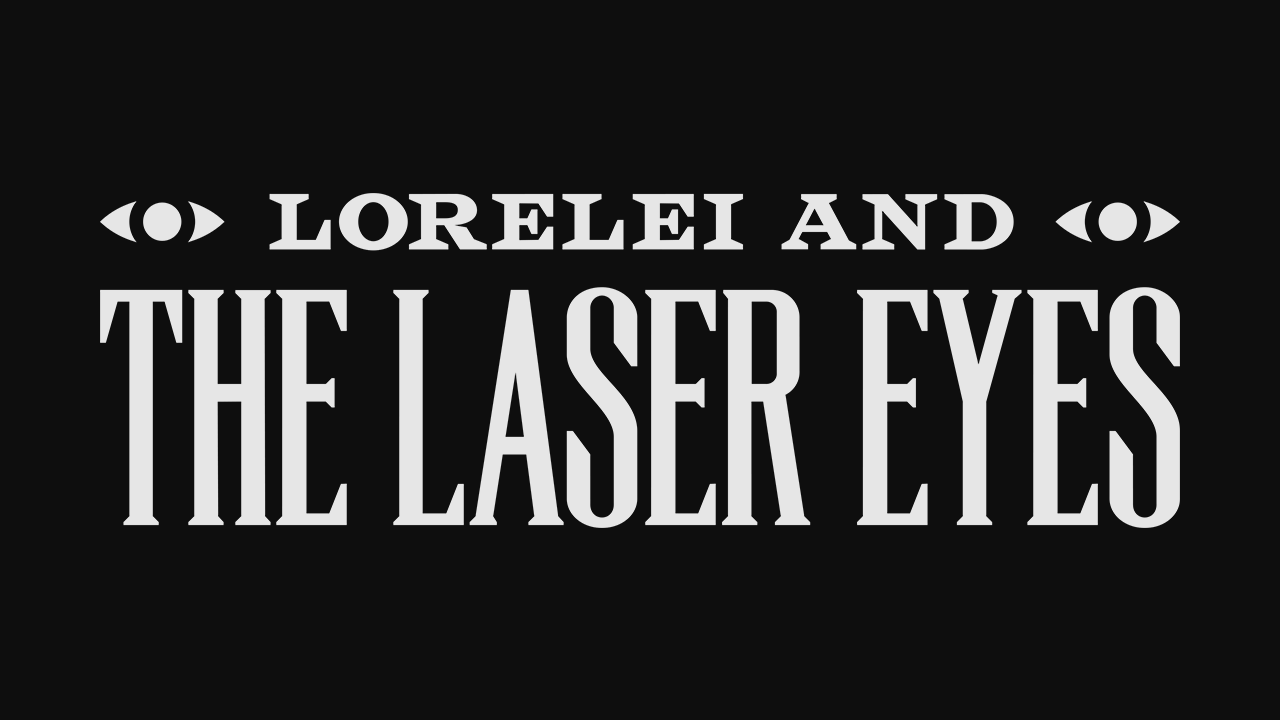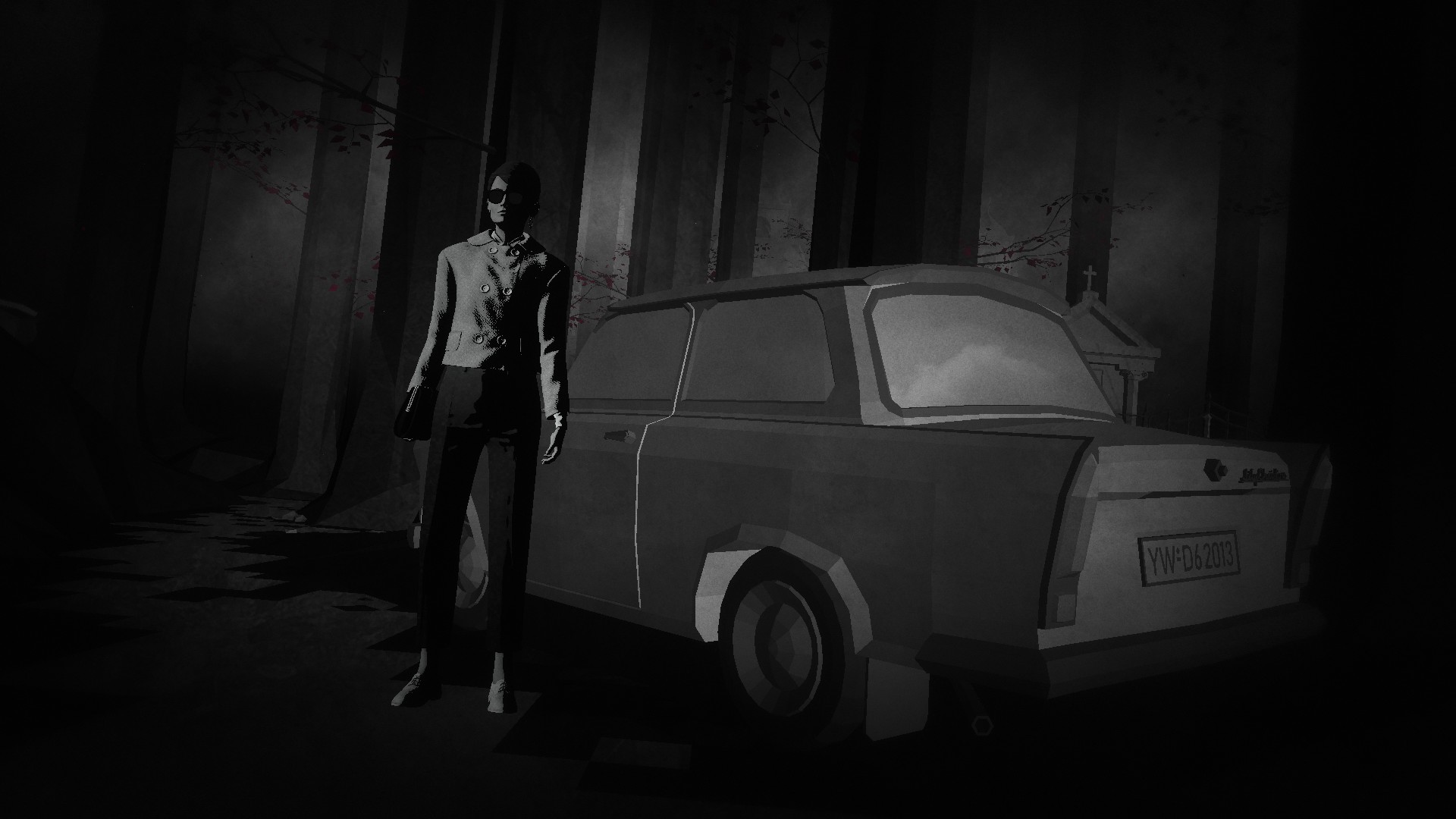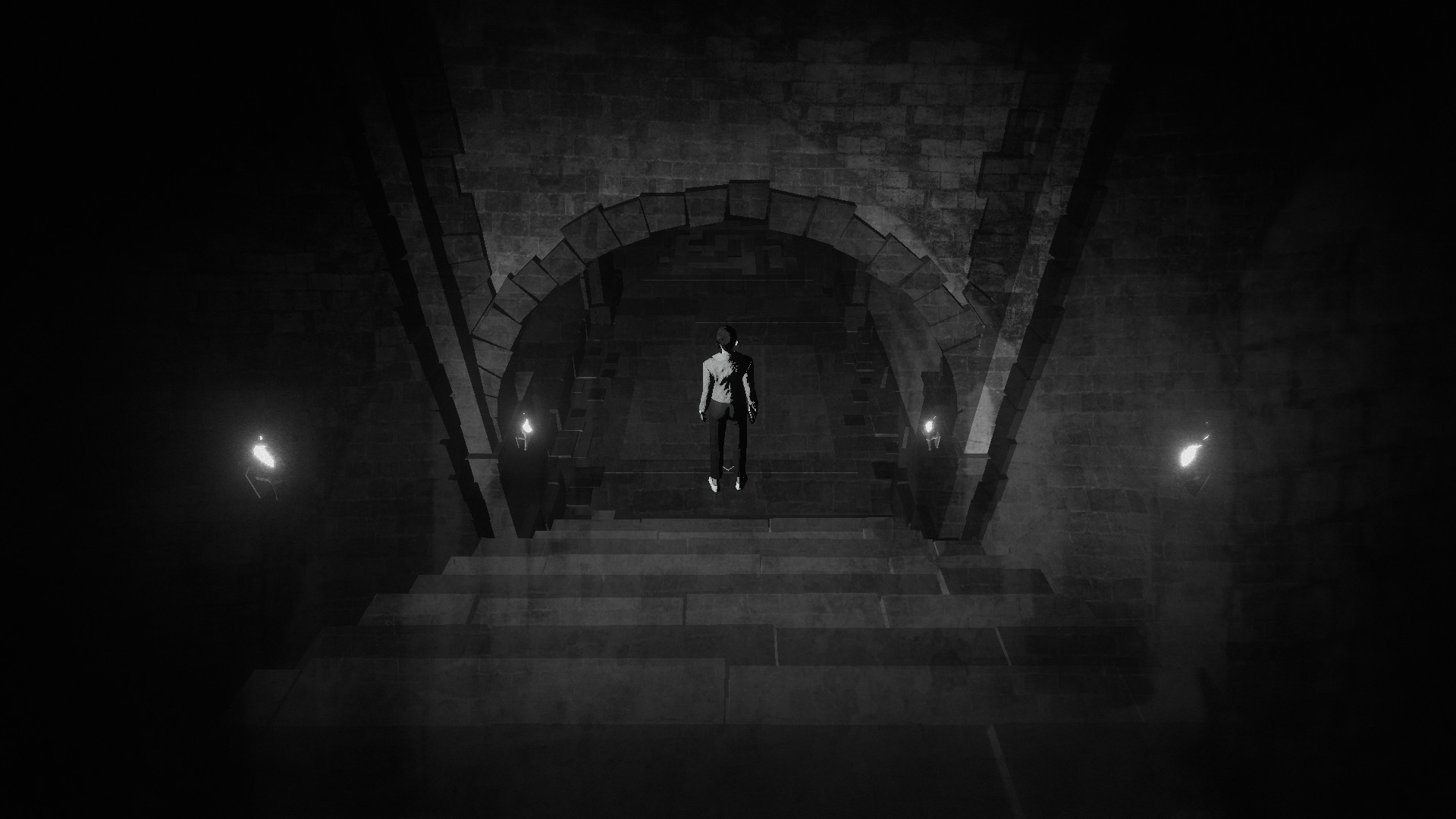
Simogo’s latest creation, Lorelei and the Laser Eyes, is nothing if not an eye-catching work of art. The small Swedish development studio’s distinctive trailers sold me instantly: a mysterious mansion, haunting music, and a bevy of intricate puzzles. When the in-game manual suggested I might want a pen and paper, I knew I was in for something really special. Did it deliver – and was there anything valuable from a Catholic perspective? Grab your notebook and sunglasses, and read on.

Lorelei and the Laser Eyes casts you as Lorelei, a dapper bespectacled woman summoned to the palatial Hotel Letzes Jahr by a mysterious artist named Renzo Nero. Nero ostensibly seeks your help with a grand artistic endeavor, but encounters with strange apparitions as well as Nero’s own obtuse manner hint at something deeper. As Lorelei, you’ll search the hotel for clues to its history, explanations of the paranormal, and the truth behind your invitation.
Your search in the mansion will uncover stories within stories, and even games within games, the latter of which will be a delight for long-time gamers or those who just appreciate the history of the medium. Simogo’s literature about Lorelei and the Laser Eyes provides some additional details on these if you’re inclined to look, but I would recommend going in as blind as possible. By the end, it may not be entirely clear what happened, but you’ll have been treated to fun challenges and interesting themes.

Navigating the mansion is achieved with the simplest of controls – basic movement with direction keys (on the PC, at least), and a single button to interact. That constraint is indicative of a repeating theme in Lorelei’s design: heightened creativity through the exploration of self-imposed limits. The gameplay may fundamentally be about walking around a maze picking up information and unlocking doors, but Simogo uses that foundation as a way of playing with your expectations and producing a panoply of perfect puzzles.
If you’re a fan of the Myst series, third-person point-and-click adventures, or the non-combat side of a game like Resident Evil, this game is an easy recommendation. The puzzles are inventive, satisfying, and perhaps with one exception (for me, at least), clear. The solution is rarely immediately apparent, but you can trust that it is not hidden behind logic that is only sensible in the designers’ minds. The information you need will always eventually be at your fingertips, and as you play you’ll build an intuition for when you don’t yet have what you need.
Even if you’re not versed in point-and-click adventures, Lorelei shares enough DNA with the exploratory aspects of a Zelda or Metroid game such that it could be a good entry point. That’s not to say it’s easy – but Lorelei and the Laser Eyes does sport a number of quality-of-life features that help you stay on track. Any information you pick up is automatically tracked in Lorelei’s “Photographic Memory”, meaning you only need to take notes when trying to make connections between pieces of information, to remember dialogue (more for plot than puzzles), or out of convenience. Furthermore, anything you’ve attempted, but couldn’t solve, is tracked in a list of “Mental Notes”, so you don’t have to struggle to recall anything you haven’t yet completed.
While the Photographic Memory and Mental Notes features are excellent additions to a game like Lorelei, the limited controls do generate a bit of friction in an otherwise smooth experience. There’s no mouse to be had, even in the menus, so you must navigate through categories of memories with the direction buttons. Perhaps more frustrating is the fact that certain interrelated documents, such as the maps you’ll eventually find, cannot be flipped through like a book. Instead of being able to immediately switch between floors, you have to back out a step and select the floor of interest manually. None of this soured me on the game, but it’s a minor frustration that doesn’t seem necessary.

Lorelei and the Laser Eyes has a stylish and confident visual presentation that will strike you regardless of your previous puzzle-game affiliation. It’s almost entirely in black and white, accented with bright streaks and splashes of magenta. The architecture of the hotel is depicted with a unique blend of chiaroscuro 3D modeling, polygonal art, and subtle photographic watermarks. The details always feel like deliberate choices, whether it’s to communicate information or add to the drama. Each document you pick up was also given care and attention, with fonts, artwork, and other stylistic choices that make them feel real. (I particularly enjoyed the cover-art for the “BYTE SEYES” games you find within the mansion, which look like they could’ve been dug out of a box in my childhood memories.)
The music, too, helps to establish the atmosphere, using a unique melange of instruments, vocals, and electronics which contributes to the setting’s nebulous connection to time. However, the soundtrack takes a bit of a back seat, perhaps to emphasize the loneliness of the hotel. The sound effects are the real star of the aural show here, between your echoing footsteps, the lovely clicks of mechanical locks, and the jarring whines and buzzes of old computers and TVs (and floppy disk drives!).
I am hesitant to say much more, as part of the fun in Lorelei and the Laser Eyes is discovering its secrets on your own. In short, I found Lorelei to be uniquely captivating, and would readily recommend it, provided you’re interested in a mind-twisting, puzzle-filled adventure. It certainly consumed my attention for a couple weeks, and I imagine if it’s caught your eye, it’ll do the same for you. With the benefit of a little time for reflection, I think there’s even a bit of value to be had in its themes.

Spiritual Value
Given the deliberately open nature of the overlapping narratives within Lorelei and the Laser Eyes, it’s difficult to identify what might be described as the “main” plot. From what I could tell, it was an interesting exploration of a woman’s internal post-traumatic turmoil…but the game leaves it up to you to identify whether that’s even the actual story, and how you should interpret her actions.
What was a little more clear and substantive from a spiritual perspective is Lorelei’s considerations of art and creative activities more generally.
From the moment you step into the mansion, Lorelei and the Laser Eyes illustrates the tension between following an artistic vision and maximizing its monetary return. An overheard telephone conversation between the artist Nero and an unknown interlocutor sees Nero encouraged to conform his vision to a more profitable standard, which disgusts him. That reaction is understandable, and perhaps praiseworthy, but the story does not stop there. Instead, Nero seems to abandon all concerns outside of his own mind, leading to ever more self-directed and self-referential works. What starts seemingly high-minded leads to the entertainment of harming the audience and ends with physically self-destructive behavior.
Nero routinely refers to “Mammon” when describing any pecuniary interests that he declined in favor of his art, but is blind to a more expansive understanding of idolatry. He may not idolize money per se, but he certainly idolizes the recognition and prestige to which he thinks he’s entitled. His vanity is ultimately just as destructive to his art as capitulation for money would’ve been, as in both cases he’s not appealing to a standard outside of himself.
To avoid Nero’s fate, we must first remember that we are the lovingly crafted handiwork of the divine Artist. Whether we are engaged in conventionally artistic activities, or just going about our lives, it is God’s artistic vision we should be interested in following. To seek anything other than Him is to orient ourselves away from the very Author of our existence. As St. Augustine writes in The City of God, “Anyone who is anything at all is this: a keeper of God’s commandments; for anyone who is not this is nothing at all, because he is not being reformed to the image of the truth but remains instead in the likeness of vanity.” (Book XX, ch. 3) Being reformed to the image of the truth doesn’t obliterate our originality or individuality, but rather perfects it. We are the most “ourselves” when we live within the brushstrokes of the artist of the burning bush, so that we too may be on fire and not consumed.
Nero may have been right to trust in his own artistic sense, but at some point it seems to me he was driven more by a sense of his own superiority than a desire to communicate with an audience. In turning so thoroughly inward, he necessarily rejected God’s grace, with disastrous results. May we have eyes to see what he could not.

Scoring: 97.50%
Gameplay: 5/5
Story: 4.5/5
Art Direction: 5/5
Music and Sound: 5/5
Parental Guidance
Use of Catholic symbols that raises Spicy’s hackles: Nero has assembled a crucifix with himself on it on the first floor, pretends to be a priest in a confessional (in which he refers to deadly sins other than murder as “such a small sin”), and identifies with Eden’s serpent. In my view, Nero is not to be emulated, so this is more a character bothering me who should bother me rather than something wrong with the game. Still, I felt it worth noting.
Violence: There is imagery depicting what is clearly before and after violent acts which would be disturbing to children, but I’m not sure they would be interested in this game in the first place. Revolvers are often brandished, but the shots are not shown.
Suggestive Themes: There’s nothing suggestive depicted visually, and I do not recall anything overt amongst the various documents you find, with the exception of a polygamous relationship described on the box of a fictitious movie.
